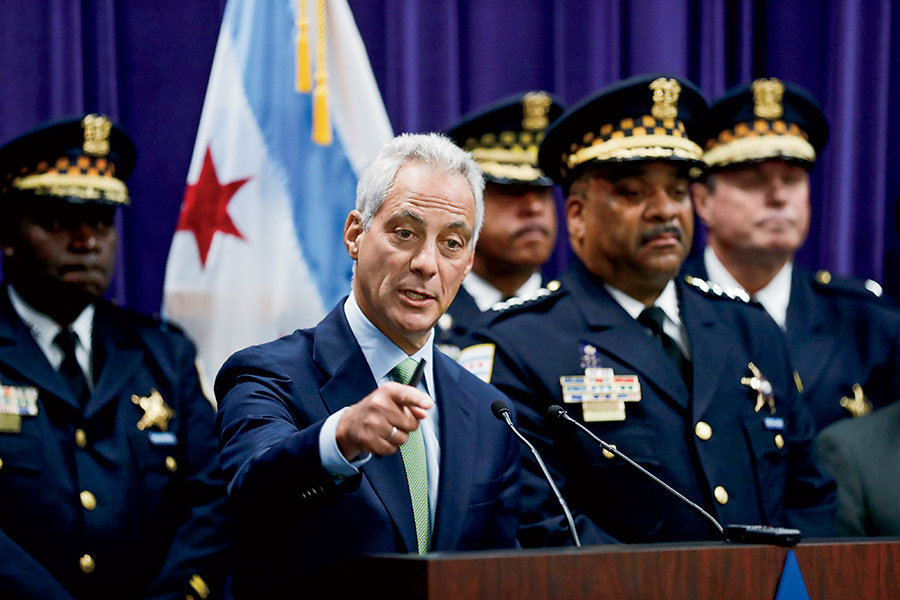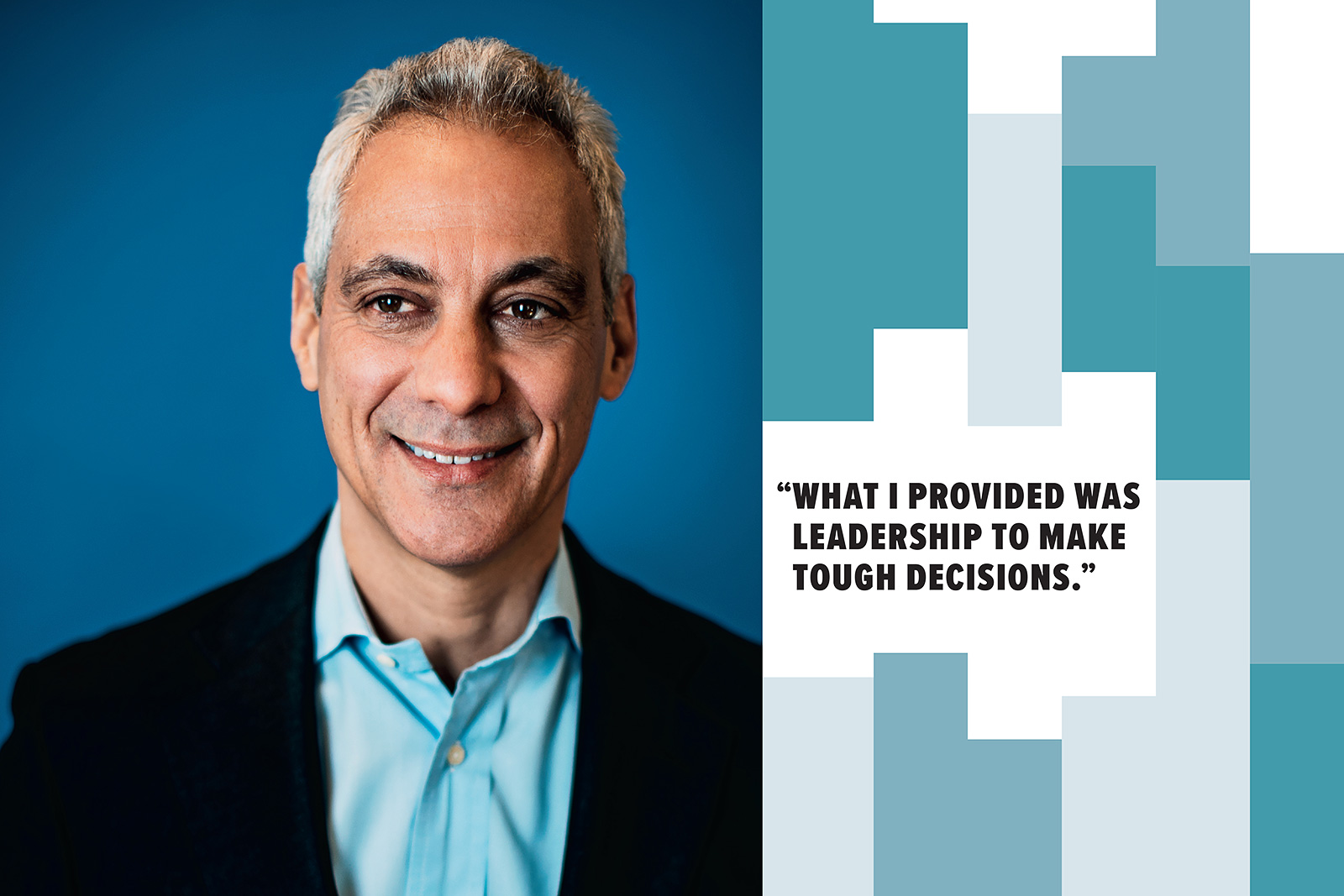In mid-March, two months before Rahm Emanuel would end his eight-year run as mayor, I sat down with him in his office to talk about his legacy. It was the day before the City Council approved two of the final pieces: the police and fire academy on the West Side and the Lincoln Yards development along the North Branch of the Chicago River. A week afterward, the Sun-Times published excerpts from the mayor’s emails detailing his exit interview strategy, to which he adhered closely during our chat: specifically, spinning the closing of 49 schools into a success story. But first we needed to discuss the ice pack he was holding.
What did you do to your knee?
I did a yoga class and a weight class, and I stressed it. For the first time ever, yesterday I did acupuncture. I’ve stopped yoga for a week, which is very unusual for me. I’ve been doing it for 20 years.
I guess I’ll start, since this is an interview about your legacy.
Not my leg?
We’ll start with your leg, move on to your legacy.
We’re working our way up.
What do you think your legacy as mayor will be?
The city and the people of the city are better prepared for the future than the day I walked into the office. A lot of our problems got deeper and more entrenched, because for years we either didn’t address them or willfully ignored them. But whether it was the schools academically, whether it was the financials, whether it was the diversity of the economy, whether it was inclusion in the economy, whether it was the community colleges, whether it was the transportation system, whether it was parks or libraries, there’s no place that we said of any problem, “You know what? I’m not gonna deal with it.”

What do you feel you did to prepare Chicago for the future?
You have to start with what I walked into. When I was running, everyone said, “Why would anybody want to do this?” In fact, you were one of them. Because of the size, the scope, the scale of the problems. I happen to think education is the most important thing. If you start on one end, we made kindergarten full-day for every child, which it wasn’t. We made pre-K full-day for every child, which it wasn’t. We added an hour and 15 minutes [to the elementary school day]. Fifty percent of our kids this year are going to be graduating with college credit. When I walked in, it was 31, 29. What I provided was leadership to make tough decisions. Now the second thing is, our economy was faltering. Our unemployment was one of the highest of any big city. Today Chicago has not only its lowest unemployment ever, but two other things: Last year our unemployment dropped more than any of the 10 other biggest cities in the United States. Our poverty rate is down by 20 percent [since 2011], and over the same period in the United States it was down by 12.
Advertisement
You’ve talked about education being the issue on which you expended the most political capital. I assume that refers to school closings. Why did you make that decision?
It’s interesting you would say that. You would never ask me about pre-K. You never asked —
I didn’t have to because you brought it up.
Here’s the thing. The school system was built for 550,000 students, and at the time we did it, there were 400,000. Second, we dealt with the 49 schools that were not only underenrolled but underperforming at a time when we were still living with a state system that was the worst-funded educational system in the United States. It was a tough decision. But what’s tougher is leaving kids in failure. The question of the political leader is not whether you preserve your political capital. You use it to make a change that people know should have been done. I was doing it on the fact that we were leaving kids in schools that their own neighbors were leaving and that were not ever, ever progressing on the academic scores.
Is there anything you wish you had handled differently in the process? Because there were people who felt they were not listened to or involved.
Frank Clark [now president of the Chicago Board of Education] had the Commission on School Utilization. And he had — I don’t know what was the number — 30 town hall meetings? A lot of people said, “You should have done it over a longer period of time.” That would have just elongated the pain. The school consolidation is part of the record. But it’s one piece of everything. I know what the graduation rate was when I walked in; I know what it is walking out. I know what the college acceptance was — which was we never used to record it. We now not only record it, we measure it. I know what our reading scores were, our math scores were. If it was always good, we would not have been at the bottom. But now we’re in the top percentile.
While you were mayor, the Loop boomed, but the rest of the city lost population. Particularly in the black community. Why did that happen, and do you feel you did enough to spread the wealth to the outlying neighborhoods?
So, Ted, since you know this, what happened before I became mayor?
What happened before you became mayor?
You asked me a question. You said “while you were mayor.” So obviously you have a bias. Let me answer this way. It didn’t start under my watch. Your question alluded to something that started under my watch. It’s not fair.
OK.
I will say what it did: It continued. Now what also happened: The city’s overall population is up about 30,000 under my watch. Dramatic increase among whites and Asians, continued increase among Hispanics. There’s no doubt the big challenge is what’s happening in the African American community, and we have to do things that address it. Because the other parts are working. Here’s what’s happening now: Three [predominantly black] neighborhoods — Washington Park, Woodlawn, and Bronzeville — have all seen their population go up. Where you invest in housing, transportation, parks, all these public pieces, it gives the confidence for a Jewel, a coffee shop, a restaurant to invest. It creates permanent jobs and permanent vitality in a neighborhood. And it’s not an accident.
Speaking of that, I was at the budget committee meeting this morning.
I betcha that was riveting.

They voted on the contractor for the police and fire academy. Tomorrow the City Council is going to vote on the academy. But neither of the runoff candidates to succeed you wants to build that. So why go ahead with it?
Well, the alderman [Emma Mitts of the 37th Ward] does. And she got reelected. Here’s the thing: When did I first talk about a police and fire academy? My first full year as mayor. When we announced the new Malcolm X College campus on the West Side, I said we should retrofit the old Malcolm X and make a police and fire academy. Because all the other ones were antiquated. We had nine of them. They were spread all out. It was not efficient. One of them has since been condemned.
Do you wish you’d been nicer during your time as mayor?
I’m going to ignore that question. I get a lot of nice notes from people. I get repeatedly asked to come back and speak at churches and stuff. And schools.
I want to ask you about Laquan McDonald because it was such a significant event during your tenure. When did you see the video, and why wasn’t it released earlier?
I saw it when everybody else saw it. When it was let out.
So you didn’t see it at all before it became public?
No.
Because Garry McCarthy told me he saw it two days [after the shooting].
Really?
Yes.
I’m not really asking for you to answer that. Look at what he said before versus when he was a candidate. I mean, c’mon. Get real.
So you didn’t see it until the public saw it?
No. It’s his job, and the leadership’s. They knew that. Second of all, there was a process in this city, like all other cities, that you never release material because it will influence people and their views. Soon as a judge said, “Release it,” we could have appealed. We didn’t. Third, which is what your question is alluding to, I would just refer you to two things. Alderman [Roderick] Sawyer, head of the black caucus, made a statement to Fran Spielman [of the Sun-Times]: There was never any political cover-up. And then, what I would say to you, the real question is, “What did you do?” Because this is not the first police-involved shooting in Chicago. We’ve made massive changes. We have used this to do fundamental reforms — change the makeup of the leadership, change the training, institutionalize practices so they’re wired into the DNA of the police department, not just some abstract authority dictating it, and not have public safety become the first casualty of police reform.
Did that situation have anything to do with your decision not to run for reelection?
No.
Soon either Toni Preckwinkle or Lori Lightfoot will be sitting right there. What’s a single piece of advice you have for whoever’s in that chair next?
I’ll leave them a note, and that advice will be private, because that’s what we do. In the same way that my predecessor did it for me. But in general, I would just say we have something special here, and you have the gift of having the responsibility to lead it. Enjoy it and love it.
This interview has been edited and condensed for clarity.




Comments are closed.